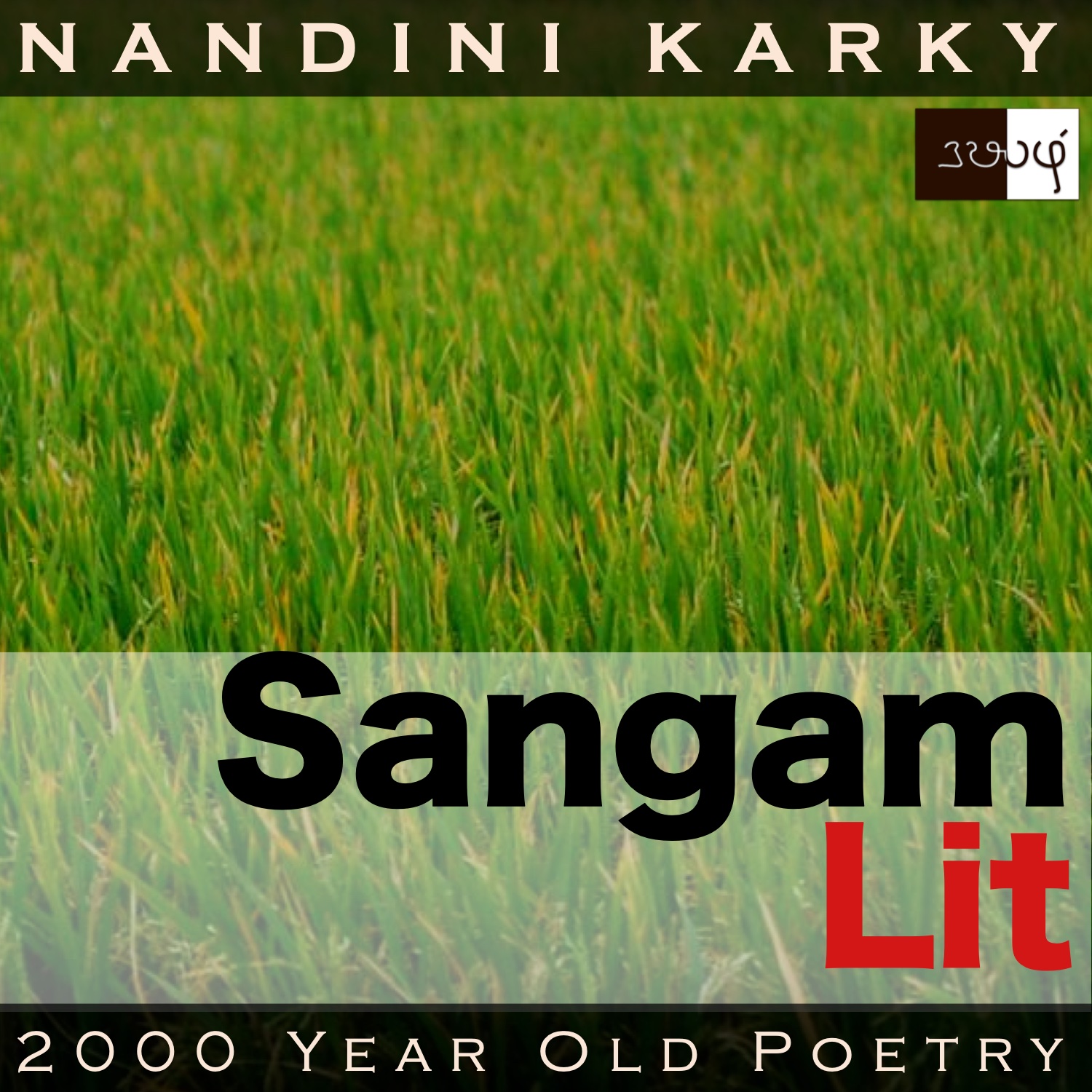Podcast: Play in new window | Download
Subscribe: Apple Podcasts | Spotify | Amazon Music | Android | iHeartRadio | TuneIn | RSS | More

In this episode, we perceive some mind games in action, as portrayed in Sangam Literary work, Kurunthogai 8, penned by Aalangudi Vanganaar. The verse is situated in the agricultural regions of ‘Marutham’ and speaks in the voice of the courtesan, passing on a hidden message to the lady’s friends, listening nearby.
கழனி மாஅத்து விளைந்து உகு தீம் பழம்
பழன வாளை கதூஉம் ஊரன்
எம் இல் பெருமொழி கூறி, தம் இல்,
கையும் காலும் தூக்கத் தூக்கும்
ஆடிப் பாவை போல,
மேவன செய்யும், தன் புதல்வன் தாய்க்கே.
Lush green paddy fields rise up before our eyes, pointing to how agriculture and abundance seemed to go hand in hand then. A couple of words produce this effect and those being ‘கழனி’ meaning ‘field’ and ‘பழன வாளை’ referring to ‘scabbard fish that lives in the water-filled paddy fields’. From the fields, we walk into homes in the phrases ‘எம் இல்’ meaning ‘my house’ and ‘தம் இல்’ meaning ‘his house’. Then, we encounter ‘கையும் காலும் தூக்கத் தூக்கும்’ meaning ‘lifting arms and legs as they are lifted’. The first image that came to me was that of a puppet raising its arms and legs as someone wielding it pulls the strings. Adding to the confusion was the connecting noun ‘பாவை’, with a common meaning of ‘doll’. But, on exploring further, I learnt that the word ‘பாவை’ could also mean ‘an image’, which makes sense, as it occurs as ‘ஆடிப் பாவை’, with the ‘ஆடி’ possibly referring to ‘கண்ணாடி’ or ‘a mirror’. Even though my mind seems to be oscillating between ‘puppet’ and ‘mirror’ still, I have decided to go with ‘mirror’, giving the word ‘ஆடி’ its due. Ending with ‘தன் புதல்வன் தாய்க்கே’, which means ‘his son’s mother’, the verse hints at hidden layers!
His son’s mother? Surely, there are simpler words to refer to this relationship! Let’s explore the context to understand the reason for this complicated reference. In an agricultural town, the man and lady were leading a married life, when the man took to keeping the company of courtesans. After a while, he returned home to fulfil his duties and at this time, word reached the courtesan’s ears that she was spoken of disparagingly by the man’s wife. Intending to give a reply to the lady, while the lady’s friends listen nearby, she says, “As the sweet fruit that blooms in the mango tree by the fields falls into the paddy field’s waters, a scabbard fish grabs it in the man’s town. When he comes to my house, he speaks lofty words. But, when in his house, akin to an image in the mirror that lifts its hands and legs exactly like the person peering into it, he seems to do as she bids – she, the mother of his son!” With these words, the courtesan conveys to the lady that she’s not to be blamed if the man sought her company!
As her weapon, the courtesan employs sharp words shot at the lady. Before she gets to the point, the courtesan talks about the man’s town, where there are green paddy fields and mango trees blooming near them. Then, she zooms on to a moment when a mango fruit breaks from its branch and falls into the water-soaked paddy fields. At this moment, the scabbard fish pounces on it and snatches it away. Indeed, a fish that seems to have sharp reflexes and good taste! The courtesan mentions these words only to describe the man’s rich village. However, there’s a metaphor lurking within, which we will understand in a while. After that picturesque description, she turns to accusation saying whenever the man happened to come to her house, he would speak words of praise to the courtesan, whereas he became a totally different person in his house. She proceeds to narrate about the man’s character with a fascinating simile. Like an image in a mirror that lifts its hands and legs following the person looking into it, the man too seemed to do whatever that woman says. In other words, the man’s a mere puppet in the hands of this woman, the courtesan concludes. And, when we ask her who this woman might be, she says, ‘Don’t you know? It’s the man’s son’s mother!’ Note how she avoids using the word ‘wife’ or ‘lady’ and seems to see the connection between the man and his wife only through their son. Within that, the courtesan is telling the lady that she was not dear enough to the man, and that he seemed to be doing as the lady wished, only because they were connected through marriage and the birth of their son!
On average, women are considered to be better at verbal intelligence and this skill seems to acting like a double-edged sword here. Returning to that scene of the scabbard fish snapping at the falling mango, the courtesan places a metaphor for how she accepted the man when he sought her company, akin to the mango falling on its own accord into the paddy fields. She seems to say that’s it’s natural to accept the man when he came to here and that there was no need for anger on the lady’s part. In the end, if we probe into the reasons for this state of conflict between two women over a man, the only culprit could be the uneven distribution of power and resources at play in this ancient farming society!




Share your thoughts...